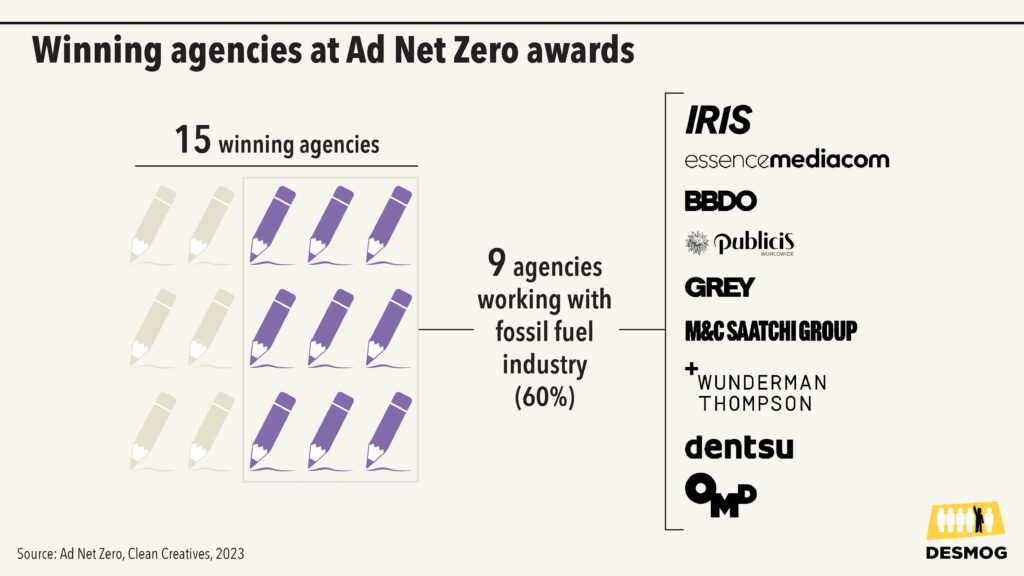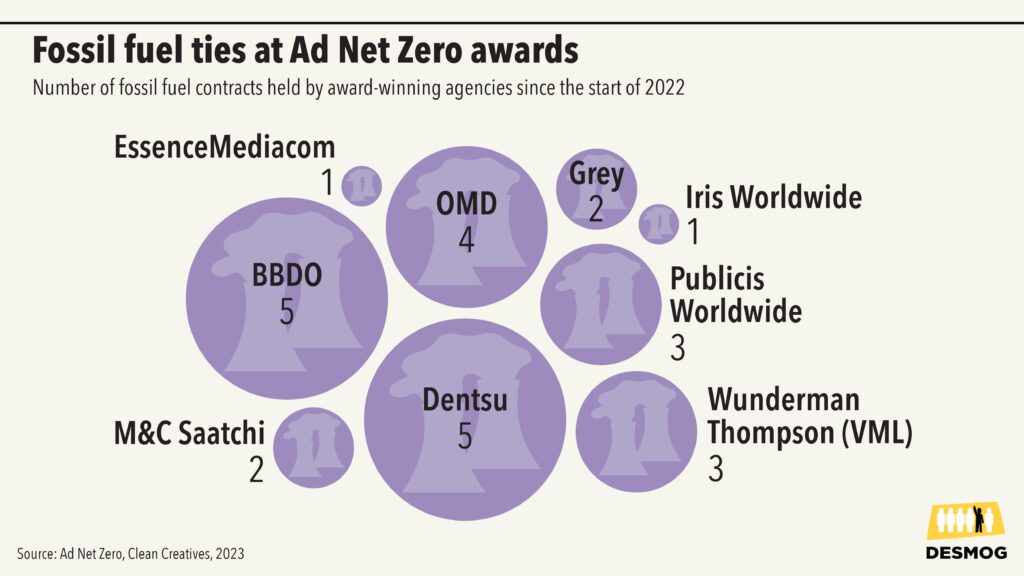Three-quarters of prizes at the UK’s top sustainable advertising awards went to agencies who work for the fossil fuel industry, a DeSmog analysis has revealed.
The second annual Ad Net Zero awards were held in partnership with industry magazine Campaign in London in November to recognise internal agency sustainability practices and green campaigns on behalf of clients including Heineken, Vodafone, and Sky.
By cross-referencing winners with research from advocacy group Clean Creatives, DeSmog found that 17 of the 23 awards for agencies (or 74 percent) went to companies who represent oil and gas producers or utilities. Those agencies included M&C Saatchi, Wunderman Thompson (now part of VML), Iris Worldwide, and the media group Dentsu.
“Grand Prix” awards went to Grey, which has worked for BP and Indian Oil in the last two years, and EssenceMediacom, which has represented Shell since at least 1995, according to Clean Creatives. Both agencies are owned by the London-based global media group WPP.
In total, nine of the 15 agencies who won awards at the November 2 gala (or 60 percent) hold or have recently held contracts with a combined 21 fossil fuel and utility companies, including ExxonMobil, Chevron, Saudi Aramco, and TotalEnergies.
Climate advocates said that giving green accolades to companies who continue to produce adverts and public relations campaigns for major polluters undermines the credibility of Ad Net Zero, an advertising industry body formed in 2020 amid a broader push by the business world to show it was serious about tackling the climate crisis. The group’s members include six of the major advertising networks that dominate the industry — WPP, Omnicom Group, Interpublic Group (IPG), Publicis, Dentsu, and Havas.
“For Ad Net Zero to reward agencies for environmentally friendly work, when those same agencies are managing campaigns to promote the long-term future of fossil fuels, is disingenuous and removes any credibility from their corporate positions,” said Dominic Lyle, director of communications at financial think tank Planet Tracker.
In response to DeSmog’s findings, Ad Net Zero said its award entry forms ask for specific evidence of real-world impact from sustainability campaigns in areas such as food waste or greenhouse gas emissions, and that promoting such work could inspire change in the industry.
“It is possible — and probable — at this stage of the industry’s climate journey that the best work is produced by an agency that is also connected in some way to the types of companies you [DeSmog] highlight,” said an Ad Net Zero spokesperson. “But will it help anyone if that work is considered to be invalid or of no value as a learning opportunity for fellow advertising professionals?”
Co-host Campaign said it was aligned with Ad Net Zero’s responses.

Mixed Messages
Some agencies’ winning campaigns at the Ad Net Zero awards, which were sponsored by Google, pushed sustainability messaging that appeared to be in direct conflict with some of their other clients’ less than planet-friendly business models.
Independent agency M&C Saatchi won an award for its plastic pollution awareness campaign The Plastic Forecast, made for Australian philanthropic organisation the Minderoo Foundation, which visualises the weight of microplastics falling from the sky in raindrops on a given day.
M&C Saatchi’s website says it has a 16-year relationship with Coca-Cola, the world’s worst plastic polluter according to research by environmental group Break Free From Plastic. Coca-Cola also has a record of actively fighting against plastic pollution legislation, according to a report by U.S.-based investigative newsroom The Intercept.
Clean Creatives research shows M&C Saatchi also represents Origin Energy, which operates Australia’s largest coal-fired power station, and South African fuel brand Astron Energy.
M&C Saatchi told DeSmog that less than two percent of its revenue came from fossil fuel clients in 2022, and that it has three environmental commitments relating specifically to client work: building “climate literate teams”; growing revenue from “planet-positive campaigns”, and reviewing the environmental approaches of potential new clients.
Agencies have, however, been criticised for only applying environmental reviews to prospective clients — allowing them to continue doing business with existing polluting clients. In November, DeSmog reported that this loophole had enabled McCann, part of the IPG network, to begin pitching to retain their client Saudi Aramco, the largest oil company in the world.
Supporting Shell
Wunderman Thompson, part of the WPP network, won an award for its Vodafone e-waste campaign, with the entry noting that smartphones will contribute to approximately 10 percent of global carbon emissions by 2040.
According to Clean Creatives, Wunderman Thompson has made adverts for Shell, one of the biggest corporate contributors to global carbon emissions in history, since at least 1929.
Wunderman Thompson, Dentsu and WPP did not respond to requests for comment.
Ad Net Zero judges also praised Iris Worldwide for its “actions not ambitions” campaign to promote Scottish energy company SSE’s £12.5 billion investment in the UK’s green energy transition.
Clean Creatives’ records show Iris Worldwide also works for Shell, which announced in June that it was “stepping back from renewable power investments that don’t fit our strategy or do not generate enough returns.” In September, Reuters reported that several employees had written an open letter to Shell CEO Wael Sawan, protesting the renewable energy cutbacks.
The following month, climate protesters staged a “die-in” at the London headquarters of agency network Havas after the company won a bidding war for a portion of Shell’s advertising account.
Web archives show Iris Worldwide, part of the Cheil Worldwide network owned by Samsung, has recently worked on brand awareness and social strategy for the oil major.
Iris said in response to DeSmog’s findings that it was “vital” that case studies for promoting green action through advertising were shared — whoever created them.
“Inclusivity is a core pillar of the awards and to that end we don’t think any companies should be excluded from sharing the work they do for their clients,” said an Iris spokesperson.

‘Advertised Emissions’
The extent of fossil fuel ties among the Ad Net Zero award winners underscore the challenges of transitioning an industry facing growing scrutiny over its work for climate-damaging companies.
Ad Net Zero members pledge to follow a five-step action plan to reduce emissions from business operations and supply chains, advertising production, advertising placement, and events, as well as promote sustainability through campaigns. Members must also report on their progress towards implementing net zero goals set in line with the 2015 Paris climate agreement.
“You may say compared to the scale of an energy company it [the industry’s operational and supply chain emissions] is small, but it is millions of tonnes of carbon, and we have to take care of that,” Stephen Woodford, CEO of the Advertising Association, one of Ad Net Zero’s founder organisations, told a panel at the Cannes Lions Festival of Creativity in June.
Critics say, however, that Ad Net Zero’s focus on operational emissions obscures a much bigger problem: The role of advertising in exacerbating the climate crisis by driving demand for damaging products, from flights to SUVs — a phenomenon defined by advocacy group Purpose Disruptors as “advertised emissions.” The concept was adopted by the UN’s corporate decarbonisation campaign Race to Zero in 2022, but is not recognised by Ad Net Zero.
Dentsu — which won the Ad Net Zero award for best internal sustainability practices at a large agency — published an estimate of its “advertised emissions” in July, which found they were 32 times higher than its operational emissions.
Other major advertising companies have yet to follow suit, and Ad Net Zero’s industry backers have questioned the methodology behind the concept. ” In June, the Advertising Association and two other trade associations that established Ad Net Zero published a joint article in Campaign arguing that calculating “advertised emissions” would lead to “a significant overstating of emissions attributable to an advertising campaign by ignoring advertising’s displacement effects — the sale of one product or service means the lost sale of another in most markets.”
However, the latest Advertising Pays report, published by the Advertising Association and Deloitte, says that “advertising encouraging market growth is one of the reasons why £1 spent on advertising generates £6 to the UK economy” — a claim that critics say undermines the “displacement effects” theory.
‘Denial and Delay’
Climate advocates argue that advertising and public relations companies also play an often overlooked role in hindering climate action by working on behalf of oil and gas companies to influence both government policy and public opinion. Advertising campaigns have created exaggerated impressions of the fossil fuel industry’s investments in renewable energy or other climate solutions, helping to deflect pressure to slash emissions by fostering the false impression that the industry has the crisis in hand.
In September 2022, UN Secretary-General Antonio Guterres told the UN General Assembly: “We need to hold fossil fuel companies and their enablers to account. [This] includes the massive public relations machine raking in billions to shield the fossil fuel industry from scrutiny.”
None of the major advertising networks in Ad Net Zero have published targets to address “advertised emissions” by winding down campaigns promoting polluting products, or stopping work to portray fossil fuel companies in a climate-friendly light — and Ad Net Zero does not require them to do so.
Experts fear that, as a result, the vast majority of the industry is working towards a definition of net zero that represents only a fraction of the advertising and public relations industry’s overall contribution to the climate crisis.
“The Ad Net Zero awards do credit to the creatives involved and enable some positive societal behaviour shifts, but they are dwarfed by the overarching issue of denialism in the industry,” said Victoria Harvey, a PhD researcher in advertising and climate at the University of East Anglia. “If we ignore the issue of oil and gas clients, at a time when other industries are disengaging with them, then the UK advertising industry is complicit in the denial and delay of real climate action.”
With concern growing around the role of advertising in the climate crisis, more than 900 agencies around the world have signed a Clean Creatives pledge to refuse contracts from fossil fuel companies, including large agencies such as GALE and Forsman & Bodenfors.
Ad Net Zero says it cannot mandate which companies its members can work with since this could breach competition law governing trade associations.
“Who member companies choose to work with depends on their own internal policies and we encourage — and campaign for — all our supporters to take steps to accelerate the transition to net zero both in their own businesses, in their supply chains and with their customers,” the Ad Net Zero spokesperson said.
‘Neon-lit Conflict’
In a video filmed on the night of the awards, Ad Net Zero Chair Sebastian Munden underlined the organisation’s ambitions to grow advertising campaigns designed to promote sustainability.
“I think these awards really add something, which is showing what can be done,” he said. “What I’m hoping is that every year as we look back, this year’s awards will dwarf last year’s achievements because the whole industry is learning and really striding forward.”
Nevertheless, a series of rulings by UK watchdog the Advertising Standards Authority (ASA) have underscored the reputational risks facing agencies who continue to work with polluting clients. In June, the regulator banned adverts by Shell, Repsol and Petronas for misleading consumers about renewable energy commitments.
The ASA took similar action against ads for Toyota SUVs in November, ruling that the imagery condoned a style of off-road driving that “disregarded” the impact on nature. In December, the ASA banned Norwegian oil company Equinor from repeating claims that wind, oil and gas, and carbon capture play a balanced role in its energy mix, since most of the company’s revenues still come from oil and gas, the Financial Times reported.
“If you greenwash for Big Oil you can’t soak the climate stain away by carrying a couple of eco clients,” said Andrew Simms, co-founder of the Badvertising campaign. “Agencies playing both sides leave themselves open not just to reputational and regulatory risk, but also ridicule, because people will see it for the neon-lit conflict of interest that it is.”
Subscribe to our newsletter
Stay up to date with DeSmog news and alerts







